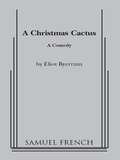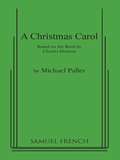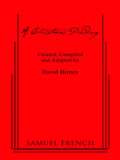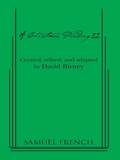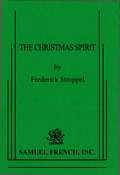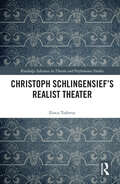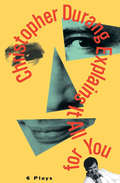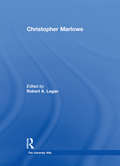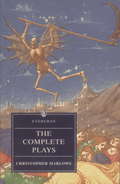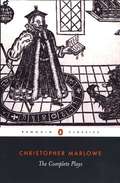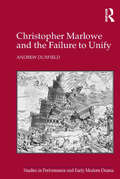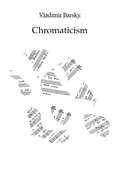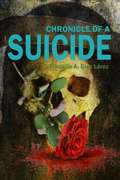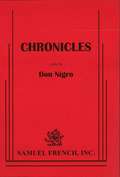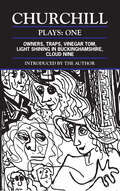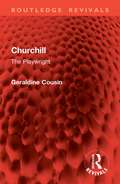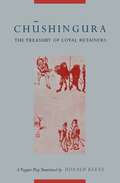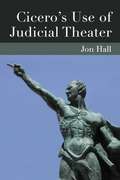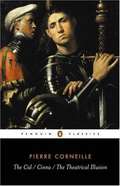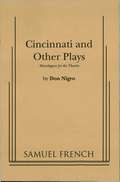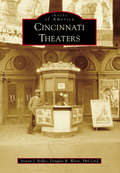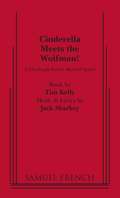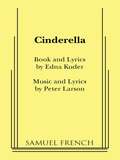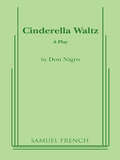- Table View
- List View
A Christmas Cactus
by Eliot ByerrumComedy / 4m, 2fScenery: Combined Interior and Exterior. Christmas Eve is tough for private investigator Cactus O'Riley, a white hot redhead with the holiday blues. She is trying to lure her secretary Fred away from his protective mother, dodging the affections of Deputy D.A. Windsor, and considering closing her business. She doesn't need the added aggravation of two fugitives who burst into her office looking for justice and a dead detective named Jake Marley. Cactus also doesn't need Fred's mother, who arrives to take Fred home but decides to stay because she thinks this is the Christmas murder mystery party she has always dreamed of attending. Christmas turns into a dickens of a holiday for Cactus as she solves mysteries, delivers small miracles and takes a second chance on love and sleuthing. Comedy, mystery and romance converge in this charming contemporary Christmas tale where goodwill and justice triumph.
A Christmas Carol
by Charles DickensEbenezer Scrooge was a lonely miser of a man, the meanest there ever was. He only loved money, and even when his best friend died, all he could think of was how to save on the funeral. One Christmas eve, Scrooge was visited by three spirits. The experience that he underwent with them shook his conscience--and his world. But did Scrooge change for the better? Charles Dickens in his inimitable style blends in emotions with high drama and conveys a powerful social message.
A Christmas Carol
by Michael PallerFull Length / Characters: 5 male, 2 female, 3 children Scenery: Composite set. This fresh approach to the classic tale faithfully conveys the magic of Dickens. On Christmas Eve in 1843 friends and family gathered at Dickens' home ask him to tell a story, but he refuses to work on Christmas Eve. If there is going to be a story, each must take a part in its telling. And so the story unfolds with the cast of 10 playing over 40 parts. "Done with respect and ingenuity. Deserves to be seen." Cleveland Free Press. "A treat ... for the whole family to enjoy." Cleveland Sunday Press.
A Christmas Pudding
by David BirneyEdited and adapted by David Birney / 3m., 3f., plus chorus 8 to 12 singers / Holiday Play with music /Simple Unit Set A Christmas celebration told in songs, stories, poems and tales by Dickens, Mark Twain, Shakespeare, Emily Dickinson, Shaw, Longfellow, St. Luke and many others collected with a host of traditional carols and holiday songs. This piece provides a perfect evening to warm hearts, stir memories and give laughter during the holiday season.
A Christmas Pudding II
by David BirneyHoliday Play with Music Character Descriptions: 3 male, 3 female, plus chorus of 8 to 12 singers Simple Set A Christmas celebration told in songs, stories, poems and tales by Dickens, Mark Twain, Frank McCourt, Emily Dickinson, Alfred Lord Tennyson, A.J. Carothers, and many others collected with a host of traditional carols and holiday songs. This piece provides a perfect evening to warm hearts, stir memories and give laughter during the holiday season. Also available from Samuel French: David Birney's original A Chrismas Pudding, which includes selections by Shakespeare, Shaw, Longfellow, St. Luke and many others! "David Birney's adaptation is an evening of song, poetry and stories that celebrates the spiritual dimensions of the season...from a diverse array of classic and modern texts, punctuated with musical interludes...[The] tone ranges from lighthearted whimsy to solemn reflection...humorous, wry...lighthearted...This is definitely a Christmas show...one (whose) openhearted sentiments send a message that's reassuringly inclusive." - The Los Angeles Times "A calorie-laden Christmas Pudding in Los Altos...a place to jump-start your holiday spirit as we enter the gratitude season of the year." - The Daily News, Los Altos, California
The Christmas Spirit
by Frederick StroppelComedy / 5m, 4f / Interior / Julia Dowling has an unexpected visitor who intends to escort her off to the afterlife. Infusing comedy into the classic Death Takes a Holiday,The Christmas Spirit is set in contemporary Long Island. Julia persuades Death to give her one more day to enjoy Christmas and invites him to be her guest at a festive party. The next day the house fills with bickering relatives, friends, the local priest - and Death, masquerading as a human, singing carols and drinking egg nog. Moments of high farce, drama and even romance arise as bright holiday fantasies collide with a not-so-merry reality. Winner of the 2002 Florida Repertory Theatre Congress of Jewelers Play Series.
Christoph Schlingensief's Realist Theater (Routledge Advances in Theatre & Performance Studies)
by Ilinca TodorutThis book is the first study of the prolific German filmmaker, performance artist, and TV host Christoph Schlingensief (1960–2010) that identifies him as a practitioner of realism in the theater and lays out how theatrical realism can offer an aesthetic frame sturdy enough to hold together his experiments across media and genres. This volume traces Schlingensief’s developing realism through his theater work in conventional theater venues, in less conventional venues, his opera work focusing on the production of Wagner’s Parsifal at Bayreuth, and his art installations on revolving platforms called Animatographs. This book will be of great interest to scholars of theater, film, and performance art and practitioners.
Christopher Durang Explains It All for You: 6 Plays (Books That Changed the World)
by Christopher DurangA collection of dark comedies about terrible therapists, dysfunctional parents, and more, from a winner of a Tony Award for Best Play and three Obies. Known for his dark, absurd humor and social commentary, Christopher Durang explores the pain and confusion of everyday life—and makes audiences laugh uproariously at the results. Sister Mary Ignatius Explains It All for You, the center of a storm of controversy for its satire of misplaced trust in religious authority, remains as powerful today as when it was originally produced. The excruciatingly funny The Nature and Purpose of the Universe asks whether Eleanor Mann’s Job-like suffering is really her fault, while Titanic takes us into the heart of children’s anger with their parents and parents’ manipulation of their children. In Beyond Therapy, two horrifyingly human therapists pursue their own needs at the expense of the most mismatched couple ever to meet through a personal ad.Also including ’Dentity Crisis and The Actor’s Nightmare, this collection demonstrates that laughter is the best surgery, slicing through prejudice and hypocrisy, cutting out dead beliefs and inflamed opinions. These black comedies, lit by lightning bolts of truth and humor, come from “one of the most explosively funny American dramatists” (Newsweek).Includes:The Nature and Purpose of the Universe’Dentity CrisisTitanicThe Actor’s NightmareSister Mary Ignatius Explains It All for YouBeyond Therapy
Christopher Marlowe (The University Wits)
by Robert A. LoganIn uncovering the origin of the designation 'University Wits', Bob Logan examines the characteristics of the Wits and their influence on the course of Elizabethan drama. For the first time, Christopher Marlowe is placed in the context of the six University Wits, where his reputation stands out as the most prominent, and the impact of his university education on his works is clarified. The essays selected for reprinting assess the most significant scholarship written about Marlowe, including biographical studies, challenges to familiar assumptions about the poet/playwright and his works, compositions on groupings of his works, on individual works, and on subjects particular to Marlowe. Unique in its perspective and in the collection of essays, this book will interest all students and scholars of Renaissance poetry, drama, and specialized cultural contexts.
Christopher Marlowe: Complete Plays (The Everyman Library #102)
by Christopher Marlowe J. M. DentTheir texts fully restored by recent scholarship, Marlowe's astonishing works can now be appreciated as originally written. For the first time, this edition boasts the complete plays - including two versions of Doctor Faustus.Blasphemy, perversion, defiance and transgression ... in a series of compelling tragedies, Marlowe challenged every authority of heaven and earth. From the proud wrath of Tamburlaine, the tyrant of Asia, to the racked anguish of Edward II, himself in thrall to unspeakable desires; from God's own Machiavel, the Duke of Guise, to Barabas, the Jew of Malta, curse of Christianity: all are taboo-breakers, to be broken in their turn. And in the tragedy of Doctor Faustus we perhaps read Marlowe's own: a tale of brilliance and audacity - and of terrible, inexorable punishment.Their texts fully restored by recent scholarship, Marlowe's astonishing works can now be appreciated as originally written. For the first time, this edition boasts the complete plays - including two versions of Doctor Faustus.
Christopher Marlowe: The Complete Plays
by Christopher Marlowe Robert Lindsey Frank RomanyMarlowe's seven plays dramatise the fatal lure of potent forces, whether religious, occult or erotic. In the victories of Tamburlaine, Faustus's encounters with the demonic, the irreverence of Barabas in The Jew of Malta, and the humiliation of Edward II in his fall from power and influence, Marlowe explores the shifting balance between power and helplessness, the sacred and its desecration.
Christopher Marlowe and the Failure to Unify (Studies in Performance and Early Modern Drama)
by Andrew DuxfieldIn this sustained full length study of Marlowe's plays, Andrew Duxfield argues that Marlovian drama exhibits a marked interest in unity and unification, and that in doing so it engages with a discourse of anxiety over social discord that was prominent in the 1580s and 1590s. In combination with the ambiguity of the plays, he suggests, this focus produces a tension that both heightens dramatic effect and facilitates a cynical response to contemporary evocations of and pleas for unity. This book has three main aims. Firstly, it establishes that Marlowe’s tragedies exhibit a profound interest in the process of reduction and the ideal of unity. Duxfield shows this interest to manifest itself in different ways in each of the plays. Secondly, it identifies this interest in unity and unification as an engagement in a cultural discourse that was particularly prevalent in England during Marlowe’s writing career; during the late 1580s and early 1590s heightened inter-confessional tension, the threat and reality of foreign invasion and public puritan dissent in the form of the Marprelate controversy provoked considerable public anxiety about social discord. Thirdly, the book considers the plays’ focus on unity in relation to their marked ambiguity; throughout all of the plays, unifying ideals and reductive processes are consistently subject to renegotiation with, or undercut entirely by, the complexity and ambiguity of the dramas in which they feature. Duxfield’s focus on unity as a theme throughout the plays provides a new lens through which to examine the place of Marlowe’s work in its cultural moment.
Chromaticism
by Vladimir BarskyFirst Published in 1996. Routledge is an imprint of Taylor & Francis, an informa company.
Chronicle of a Suicide
by Franklin A. Díaz Lárez Julia Perez CasconA narrative of a suicide, and all the fundamental causes and circumstances that surrounded it. It is a chronicle narrated in the first person by its author, about the culmination of the circumstances that pushed a young real estate agent to commit the greatest barbarity that any human can commit against themselves; suicide. It is a detailed explanation of the events that drove him to madness, that drove him to the abyss of obsession. The story starts with a change of office address, to a location in which our protagonist meets the cause of his delirium; a beautiful young lady who had just turned sixteen. The very day they met, both were automatically charmed by one another, and influenced by loving emotions. However, as time passed, their family bonds (they are cousins), the girl’s toxic influence, and her immaturity drive things towards a fatality.
Chronicles
by Don NigroComic Drama / 4m, 5f / Unit set / In 1920 the Pendragons gather for the first time in years at the crumbling family mansion in Ohio where Matt Armitage lies dying. As his daughter Dorothy, who can neither hear nor speak, provides a running commentary which is heard only by the audience, her wild sister Jessie chases their half brother John Rose from room to room and tries to fathom what betrayal is behind her father's refusal to speak to her mother. Uncle David, an eccentric poet, is back from scouring Europe for a lost girl. John Rhys Pendragon, the journalist, broods over his wife's death and the loss of his beloved daughter. Sister Lizzy bustles around trying to feed everybody while enduring her own grief as Sarah, the housekeeper, is being driven mad by the confusion. Trapped in the labyrinth of a darkly cruel history, these people nevertheless love each other and make each other laugh. Richly textured and intricately woven through time and space, this funny and moving addition to the author's series the Pendragon Plays.
Churchill: Plays One
by Caryl ChurchillThe plays in this volume represent the best of Churchill's writing up to and including her emergence onto the international theatre scene with "Cloud Nine." The volume also contains a new introduction by the author as well as short prefaces to each play.
Churchill: The Playwright (Routledge Revivals)
by Geraldine CousinFirst Published in 1989, Churchill: The Playwright is an illuminating and comprehensive guide to Caryl Churchill’s stage, television, and radio plays. Alongside Top Girls, Fen and Serious Money, plays that have established Churchill as one of the most notable writers of the decade, Geraldine Cousin examines some of Churchill's major themes-the nature of time and the revolutionary possibilities for change- in earlier plays such as Light Shining in Buckinghamshire, Traps and Cloud Nine.Through detailed analysis Geraldine Cousin shows Churchill's development towards the challenging, innovative style and combination of pungent satire and compassion, that have made her such a successful chronicler and critic of our time. This is a must read for scholars and researchers of theatre studies.
Chushingura: A Puppet Play (Translations from Asian Classics)
by Donald KeeneChushingura (The Treasury of Loyal Retainers), also known as the story of the Forty-Six (or Forty-Seven) Ronin, is the most famous and perenially popular of all Japanese dramas. Written around 1748 as a puppet play, it is now better know in Kabuki performances. In the twentieth century, cinema and television versions have been equally successful. Donald Keene here presents a complete translation of the original text, with notes and an introduction that increase the reader's comprehension and enjoyment of the play. <p><p>The introduction also elucidates the idea of loyalty. This traditional virtue, as exemplified in Chushingura, has never completely lost its hold on audiences, in spite of twentieth-century changes in Japanese society and moral ideas. Moreover, as Professor Keene points out, the excitement, color and violence expressed in the play may be considered the counterpoint to the austere restraint and understatement which are more commonly thought to be "traditionally" Japanese.
Cicero's Use Of Judicial Theater
by Jonathan HallIn Cicero's Use of Judicial Theater, Jon Hall examines Cicero's use of showmanship in the Roman courts, looking in particular at the nonverbal devices that he employs during his speeches as he attempts to manipulate opinion. Cicero's speeches in the law-courts often incorporate theatrical devices including the use of family relatives as props during emotional appeals, exploitation of tears and supplication, and the wearing of specially dirtied attire by defendants during a trial, all of which contrast strikingly with the practices of the modem advocate. Hall investigates how Cicero successfully deployed these techniques and why they played such a prominent part in the Roman courts. These "judicial theatrics" are rarely discussed by the ancient rhetorical handbooks, and Cicero's Use of Judicial Theater argues that their successful use by Roman orators derives largely from the inherent theatricality of aristocratic life in ancient Rome--most of the devices deployed in the courts appear elsewhere in the social and political activities of the elite. While Cicero's Use of Judicial Theater will be of interest primarily to professional scholars and students studying the speeches of Cicero, its wider analyses, both of Roman cultural customs and the idiosyncratic practices of the courts, will prove relevant also to social historians, as well as historians of legal procedure.
The Cid, Cinna, the Theatrical Illusion (Penguin Classics)
by Pierre Corneille John CairncrossThis volume compiles three of Corneille's most lauded plays: The Cid, Corneille's masterpiece set in medieval Spain, was the first great work of French classical drama; Cinna, written three years later in 1641, is a tense political drama; and The Theatrical Illusion, an earlier work, is reminiscent of Shakespeare's exuberant comedies. <P><P> For more than seventy years, Penguin has been the leading publisher of classic literature in the English-speaking world. With more than 1,700 titles, Penguin Classics represents a global bookshelf of the best works throughout history and across genres and disciplines. Readers trust the series to provide authoritative texts enhanced by introductions and notes by distinguished scholars and contemporary authors, as well as up-to-date translations by award-winning translators.
Cincinnati and Other Plays
by Don NigroMonologues for the Theatre. Contents: Cincinnati Nightmare with Clocks Captain Cook The Girlhood of Shakespeare's Heroines (5 monologues, titles listed below) -Axis Sally -Dead Men's Fingers -Full Fathom Five -How Many Children Had Lady Macbeth? -Notes from the Moated Grange
Cincinnati Theaters (Images of America)
by Douglas R. Weise Steven J. Rolfes Phil LindTheaters have always been the places where memories are made. There, on Saturday afternoons, children could escape the pressures of growing up to live for two hours in a fantasy world of daring heroes, dastardly villains, and dazzling magic. They were the places where awkward teenage boys could nervously, and often clumsily, put their arms around equally nervous girls. In years past, every neighborhood had its own local theater. Downtown was home to the great movie palaces, ornate portals to a world of motion picture thrills. For a unique experience, nothing could beat a hot summer night at the drive-in. Today, in the era of the corporate multiplex, the great movie palaces are just memories. Some neighborhood cinemas are now churches or venues for meetings, wedding receptions, and small concerts. Images of America: Cincinnati Theaters looks back at these marvelous old theaters and the days when they were in their prime.
Cinderella Meets the Wolfman
by Tim KellyMusical / 9m, 14f / Cinderella encounters a Prince who has inherited "The Charming Curse" and becomes a wolf every full moon. Igor, hired by King and Queen Charming to keep an eye on their son, a movie star who's come to attend the royal wedding (which will occur if Prince Charming can take a bride without devouring her), and a gypsy who can get a fortune for a genuine stuffed werewolf (she's got a silver bullet) add to the hilarity. This romp through sweet romance and bloodcurdling terror is fun for audiences of all ages.
Cinderella (Musical)
by Edna KuderChildren's musical \ 12 to 50 m & f \ Unit Set \ The enchanting version of the classic story teaches children the joy of being on stage. It is perfect to be performed by, and for, elementary schools. The text is easy to learn and the songs by an award winning composer (whose songs have been recorded by Bette Midler and Dionne Warwick) are melodic, with a simple piano accompaniment. Running time is approximately thirty minutes. The music is published in the libretto.
Cinderella Waltz
by Don NigroDon Nigro . Comedy. Characters: 4 male, 5 female. Single Set. Rosey Snow is trapped in a fairy tale world that is by turns funny and a little frightening, with her stepsisters Goneril and Regan, her demented stepmother, her lecherous father, a bewildered Prince, a fairy godmother who sings salty old sailor songs, a troll and a possibly homicidal village idiot. This play investigates the archetypal origins of the world's most popular fairy tale, contrasting the familiar and charming Perrault version with the darker, more ancient and disturbing tale recorded by the brothers Grimm. Grotesque farce and romantic fantasy blend in a fairy tale for adults.
